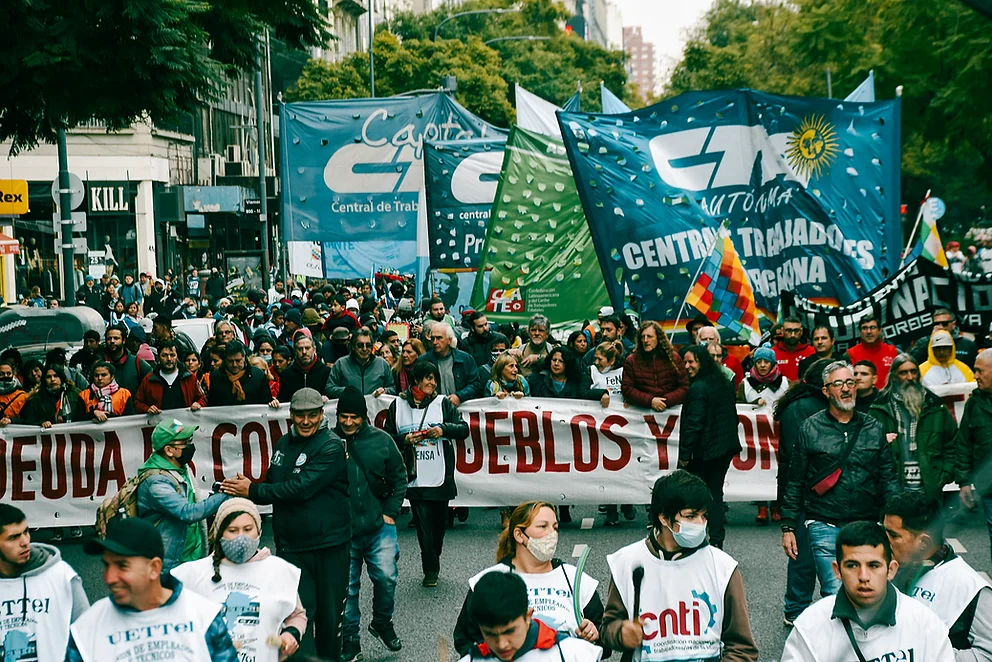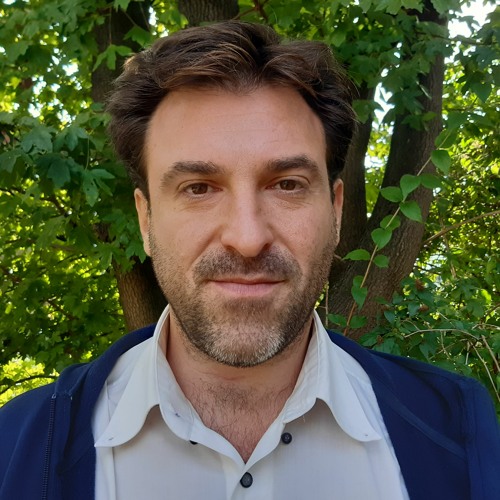Esteban Servat is an Argentinian scientist, anti-fracking and climate justice activist. The interview was conducted on Sept. 30 at the North Rhine-Westphalia Climate Transition BarCamp in Düsseldorf, organized by the Munich Environmental Institute e.V.
In his keynote address – titled “An Anti-Colonial Perspective on Climate Justice: Global System Change from the Bottom-Up” – he introduced the “Debt for Climate” movement which is led by activists from the Global South and was launched a year ago during the G-7 summit protests in Germany. The initiative aims to build power from the bottom-up by uniting workers, Indigenous, feminist, faith, environmental, social and climate justice movements in the Global North and South, to cancel the financial debt of the Global South in order to enable a self-determined, just transition.
Back in 2018, Servat went head-to-head with his government and the world’s most powerful energy companies. The issue: the Vaca Muerta oil and gas drilling mega project in Northern Patagonia, the planet’s second largest shale basin, and averting environmental catastrophe for the region and the people who live there. Following a mounting campaign of violence against him and his family, including death threats, he went into exile to Berlin, Germany.
According to Servat, debt is not only the major driver of such “carbon bombs” that threaten to exacerbate the climate crisis, but also the most powerful common denominator behind which all of these struggles can unite and fight for global social, ecological and climate justice.

Esteban Servat reported: “Germany’s largest gas and oil producer Wintershall DEA has been operating fracking facilities in Argentina for years, where rivers are poisoned, habitats destroyed and human rights disregarded for the extraction of fossil gas. It’s time to connect the struggles in the Global South with the struggles in Germany and take joint action against the destruction of our planet by multinational corporations.”
In his speech, Servat referred to the successful 2000 Jubilee debt relief campaign that led to the cancellation of more than $100 billion of debt owed by 35 of the poorest countries, suggesting the idea of a similar global interfaith campaign for the year 2025 to turn debt into climate action. The Old Testament Book of Leviticus (Lev. 25:8-17) describes the “Year of Jubilee”, which came every 50th year, as a year of releasing people from their debts, freeing slaves, and returning property to those who owned it.
According to the Debt-Fossil Fuel Trap Report, published in July 2023, countries in the Global South are currently spending five times more on repaying debt than they are on addressing the impacts of the climate crisis.
In the lead up to the COP28 World Climate Summit in Dubai the urgency of the climate crisis has never been clearer. Half of the world’s population is already living in danger zones, where they are 15 times more likely to die from related impacts, according to the UN.
“Many banks, investors and other financial actors continue to reward polluters and incentivize wrecking the planet. We need a course correction in the global financial system so that it supports accelerated climate action. That includes putting a price on carbon and pushing the multilateral development banks to overhaul their business models and approaches to risk,” said Secretary-General António Guterres earlier this summer.
#EndFossilFuels #FastFairForever
The case for phasing out fossil fuels is clear. On September 15 to 17, millions of people around the world took to the streets to figtht fossil fuels and demand a rapid, just, and equitable end to fossil fuels. Yet, governments, corporations and institutions continue to invest in and enable fossil fuel projects, prioritising the profits of fossil fuel companies and extractive development models over human rights, health and wellbeing of people and the ecological boundaries of our planet.
That’s why the Debt4Climate campaign calls for a global mobilization in conjunction with the annual meetings of the World Bank Group and International Monetary Fund (IMF) next week, October 9-15, in Marakesh. The worldwide activation, Servat says, will include an Indigenous Resistance Day (Oct. 12) and a Thomas Sankara Day (Oct. 15) in rememberance of the former president of Burkina Faso and charismatic Pan-African leader who was murdered in 1987. Sankara called “debt a cleverly managed reconquest of Africa”.
Rich countries have to date still not delivered climate funding of $100 billion per year to developing countries to help them deal with climate change that they committed to at the 2009 UN Climate Conference in Copenhagen. German chancellor Olaf Scholz said last month at the UN Climate Ambition Summit in New York that he was confident that this year, for the first time, the industrialised countries would meet the pledge to raise 100 billion dollars for climate financing. Germany itself plans to contribute two billion Euro and is hosting this Thursday a high-level international replenishment conference in Bonn to mobilize commitments for the Green Climate Fund for the period 2024 to 2027.




